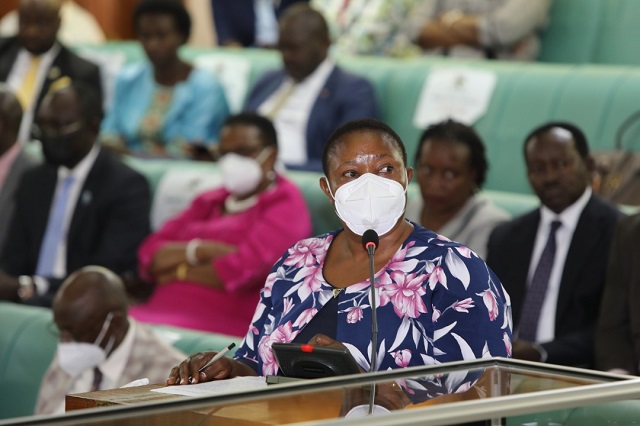
Kampala, Uganda | THE INDEPENDENT | The Minister for Presidency, Milly Babalanda, has warned the public of the rising HIV infections, urging them to refrain from risky behaviors during the coming festive season.
According to the 2021 Ministry of Health annual estimates, about 1000 people are infected with HIV every week, and about 325 people die every week due to AIDS related infections, revealed Babalanda.
“Because of the festive season, some people tend to indulge in irresponsible sexual behavior thus acquiring HIV infections. It is critical to have increased sensitization about the prevalent risk of new HIV infections and what individuals need to do in order to mitigate the risk,” said Babalanda.
Minister Babalanda was presenting a statement on the World AIDS Day to Parliament sitting on Tuesday, 29 November 2022 chaired by Deputy Speaker, Thomas Tayebwa.
She said the disruption in service delivery caused by the Covid-19 pandemic, was to blame for the increase in new infections especially among the youth.
“The impact of COVID-19 was immense such as disruption of services in education, health, livelihood, a raise in teenage pregnancy, increase in gender based violence. This escalated the HIV infections especially among the young people between 15-24 years,” Babalanda said.
She implored legislators to join in the advocacy for ending HIV/AIDS by 2030 as envisaged in the Presidential Fast Track Initiative.
MPs were concerned with the general laxity on HIV prevention, amidst an increase in new infections. Gulu City woman MP, Betty Aol Ochan, said there was need to revive strategies deployed in the early stages of HIV/AIDs which proved effective.
“In the early times of HIV/AIDS everyone was vigilant, there were programs on radio, competitions in schools and we reduced incidences of HIV/AIDS. Right now everything is quiet, for young people it seems like fighting cough or flu,” said Aol.
She proposed a revitalized school program on HIV prevention to reach the young people reported to be at most risk, as per the Ministry of Health figures.
The Chief Opposition Whip, John Baptist Nambeshe urged government to increase budgetary allocation to Uganda AIDS Commission, if government is to achieve the 2030 target of an HIV free generation.
“We are not prioritizing funding for HIV/AIDS, we therefore cannot reach the target of 2030. Always the national budget allocation to Uganda AIDS Commission is Shs 25bn but the Commission is often provided Shs15bn. This hampers its operation to do the oversight role,” Nambeshe said.
Tayebwa proposed that for such international days, the relevant committee of Parliament should come up with an independent report such that MPs are adequately informed.
This year’s national World AIDS day celebrations will be held in Rukungiri district under the theme, ‘ending inequalities among adolescent girls, young women and boys.’
*****
SOURCE: UGANDA PARLIAMENT MEDIA
 The Independent Uganda: You get the Truth we Pay the Price
The Independent Uganda: You get the Truth we Pay the Price






Ignorance,bad peer groups and poverty have led to an increase in HIV infections.
Much as treatment is available the public should know that some infections may not respond and as such, the risk of dying in a short period still exists
The behaviour driving the infection seems to be difficult to change: let this be a priority ( the problem of STDs is as old as the introduction of modern medicine in this country)
How far does knowledge go in relation to influecingi behaviour and beliefs?
Even when one stays in a far away place ( doi: 10.4314/ahs.v15i3.23)
Is this why contact tracing is a thorn in the flesh?